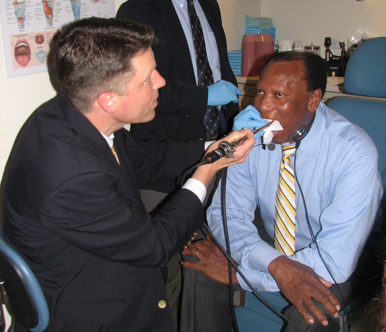A New Duet Keeps Students Singing
CFA partners with BMC to treat opera singers

When internationally acclaimed bass baritone Simon Estes, a College of Fine Arts professor, toured the Boston Medical Center’s Center for Voice and Swallowing last spring, he also received a complimentary tour of his own vocal cords.
During the visit, J. Pieter Noordzij, a School of Medicine associate professor of otolaryngology and voice disorders, probed Estes’s vocal cords during a special video strobo-endoscopic examination, which allows doctors to evaluate waveforms that arise in vocal cords during speech and singing.
“Although this type of procedure is nearly 30 years old,” says Noordzij, a head and neck surgeon at BMC’s Center for Voice and Swallowing, “our endoscopes are unique because they have tiny digital cameras that enable us to see detailed images of each tiny vocal cord in its entirety.”
And what was the doctor’s diagnosis of Estes’s powerful pipes? “For someone who has sung professionally for more than 42 years,” Estes says, “my vocal cords are astoundingly healthy. Doctors say that I will likely sing for at least another 12 years.”
Estes — who has 102 opera roles in his repertoire, including King Philip in Giuseppe Verdi’s Don Carlo and Wotan in Richard Wagner’s Der Ring des Nibelungen — divides his time between touring internationally and teaching at CFA’s school of music, Iowa State University, and Iowa’s Wartburg College. His visit to the Center for Voice and Swallowing was strictly for academic purposes. “We’re hoping to establish a firm relationship between the school of music and doctors at the Center for Voice and Swallowing,” he says. “This relationship could prove very useful for members of both institutions.”
Anyone who sings professionally, says Noordzij, should have their vocal cords regularly evaluated by a doctor of otolaryngology, the branch of medicine that specializes in the diagnosis and treatment of ear, nose, throat, head, and neck disorders. “It isn’t uncommon for singers to develop bumps, nodules, or polyps on their vocal cords,” he says. “We at the Center for Voice and Swallowing want students at the school of music to be aware of the resources at their disposal and know they can use our center for treatment.”
In the fall, Estes and Noordzij plan to further develop the relationship between the Charles River and Medical campuses by asking doctors from the Center for Voice and Swallowing to visit students at the school of music. “As singers and voice teachers,” says Estes, “we know the importance of caring for our voices. Some of my students have already developed abnormalities because of incorrect singing or singing too much. I think they would benefit tremendously from hearing what medical professionals have to say.”
Noordzij encourages all performing artists and students who have hoarseness or voice problems to seek treatment at the center. Doctors will perform a complete assessment of the larynx and recommend treatment options, which range from voice therapy to surgery.
While the evaluation is not pleasant — the procedure involves inserting a long scope approximately the width of a small finger into the mouth or nostrils and down the throat — it is fascinating to watch. “The images from the scope are transmitted on a screen, and you’re asked to make different sounds to determine that your vocal cords are vibrating properly,” Estes explains.
Doctors at the Center for Voice and Swallowing were astonished at how slowly Estes’s cords vibrate. “Typically,” Estes says, “female vocal cords — which are generally higher than men’s — vibrate about 250 times a minute, and men’s about 130. Because my voice is so low, my vocal cords are thicker, and they only vibrate 66 times per minute.”
Those slow vibrations likely account for Estes’s healthy vocal cords. “They work less than half as much as the average man’s,” he explains. But, he quickly adds, he is also diligent about caring for his voice and undergoes regular evaluations by medical professionals. “A tremendous amount of pressure is placed on the vocal cords of any opera singer,” he says. “I want my students to be aware of the treatment they may someday require.”
Vicky Waltz can be reached at vwaltz@bu.edu.